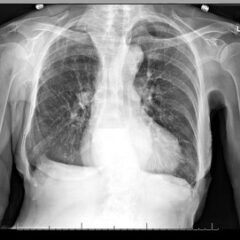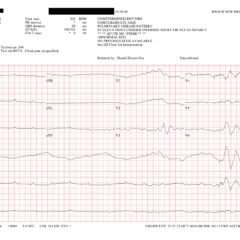Severe Hyperkalemia
ABSTRACT:
This case highlights the classic electrocardiogram (ECG) finding of a severely widened QRS complex with a sinusoidal pattern indicative of severe hyperkalemia. It also emphasizes the importance of the ECG in screening for electrolyte abnormalities and the ability to begin therapy before laboratory confirmation in the correct clinical setting. A 78-year-old male with history of end stage renal disease presented with chest pain. Findings on initial ECG allowed for rapid diagnosis and treatment before serum potassium levels were confirmed. His treatment consisted of cardiac stabilization with calcium, followed by efforts to shift potassium intracellularly with insulin and beta-agonists. Ultimately the patient was confirmed to have a severely elevated potassium level of eight mmol/L. Unfortunately, during aggressive initial management, the patient suffered a pulseless electrical activity cardiac arrest, and in accordance with his wishes no resuscitative efforts were performed. While the outcome was unfortunate, it also highlights the temporal relationship between the presented ECG findings and fatal arrhythmias. After reviewing the case, one should recognize the importance of the ECG for screening and prompt treatment of electrolyte derangements, understand the acute management of hyperkalemia, and appreciate the possibility for rapid deterioration.
Topics:
Hyperkalemia, electrocardiography, electrolytes.



